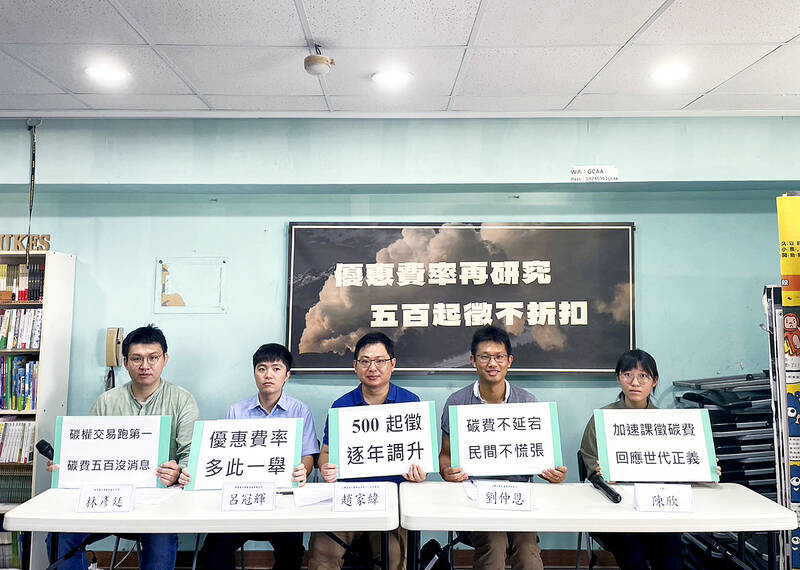Environmental advocacy groups on Thursday called on the government to finalize how much it would charge companies for carbon emissions.
The Green Citizens’ Action Alliance, together with the Environmental Rights Foundation and the Taiwan Climate Action Network, questioned the government’s resolve to reduce carbon emissions.
The Ministry of Environment is prioritizing the implementation of a carbon credit exchange system, which “has no real substantive effect on reducing carbon emissions,” Environmental Rights Foundation researcher Lin Yen-ting (林彥廷) said.

Photo courtesy of the Environmental Rights Foundation
The exchange is based on the premise that big emitters can fulfill their obligation to reduce carbon emissions simply by purchasing credits if they fall short of their commitments, Lin said.
In other words, the exchange system is a nonstarter for carbon emissions reduction in the absence of a carbon fee, Environmental Rights Foundation lawyer Lu Kuan-hui (呂冠輝) said.
“We have only three months left until we get to 2024,” which is supposed to be the baseline year of carbon emissions quantification for fee collection to happen in 2025, “but the rate has still not been decided,” Lu said.
Starting in 2025, carbon fees are to be collected annually from businesses that emit more than 25,000 tonnes of carbon dioxide the previous year, the ministry said.
As next year is to serve as the basis for the collection of carbon fees in 2025, the carbon fee rate should be finalized by the end of this year.
As for the actual carbon fee rate, the government has hinted that it might be NT$300 per tonne of carbon emissions, which is too low, Taiwan Climate Action Network chairman Chao Chia-wei (趙家緯) said.
The US Environmental Protection Agency has estimated that the cost of carbon emissions on society not reflected in market prices, known as the “externality” of carbon emissions, is about US$190 a tonne, Chao said.
“That would mean only 5 percent of the externality is reflected at the NT$300 rate,” he said.
Based on his group’s calculations, a rate of NT$500 per tonne would be the minimum necessary for Taiwan’s cement, steel and petrochemical industries, which account for one-quarter of the nation’s carbon emissions, to take the initiative to cut emissions.
The government has also proposed offering a preferential rate or a discount on carbon fees for companies in target industries that take initiatives to reduce emissions, an idea that the environmental groups did not support.
John Chung-en Liu (劉仲恩), an associate professor of sociology at National Taiwan University, said the preferential rate would defeat the purpose of charging carbon fees, which is that “polluters pay,” and would be more cumbersome to implement.
The ministry’s Climate Change Administration said that carbon fees would be charged if the companies that applied for the preferential rate failed to reach their proposed emission reduction goals.
It said the accusation that it was prioritizing a carbon credit exchange was “a misunderstanding,” as the carbon fee collection system was designed to be complemented by other measures aimed at pressuring companies to cut emissions.
It said the exchange has always been seen as “the last resort,” but did not explain why it has yet to set a carbon rate.

SHIPS, TRAINS AND AUTOMOBILES: The ministry has announced changes to varied transportation industries taking effect soon, with a number of effects for passengers Beginning next month, the post office is canceling signature upon delivery and written inquiry services for international registered small packets in accordance with the new policy of the Universal Postal Union, the Ministry of Transportation and Communications said yesterday. The new policy does not apply to packets that are to be delivered to China, the ministry said. Senders of international registered small packets would receive a NT$10 rebate on postage if the packets are sent from Jan. 1 to March 31, it added. The ministry said that three other policies are also scheduled to take effect next month. International cruise ship operators

NUMBERS IMBALANCE: More than 4 million Taiwanese have visited China this year, while only about half a million Chinese have visited here Beijing has yet to respond to Taiwan’s requests for negotiation over matters related to the recovery of cross-strait tourism, the Tourism Administration said yesterday. Taiwan’s tourism authority issued the statement after Chinese-language daily the China Times reported yesterday that the government’s policy of banning group tours to China does not stop Taiwanese from visiting the country. As of October, more than 4.2 million had traveled to China this year, exceeding last year. Beijing estimated the number of Taiwanese tourists in China could reach 4.5 million this year. By contrast, only 500,000 Chinese tourists are expected in Taiwan, the report said. The report

The Forestry and Nature Conservation Agency yesterday launched a gift box to market honey “certified by a Formosan black bear” in appreciation of a beekeeper’s amicable interaction with a honey-thieving bear. Beekeeper Chih Ming-chen (池明鎮) in January inspected his bee farm in Hualien County’s Jhuosi Township (卓溪) and found that more than 20 beehives had been destroyed and many hives were eaten, with bear droppings and paw prints near the destroyed hives, the agency said. Chih returned to the farm to move the remaining beehives away that evening when he encountered a Formosan black bear only 20m away, the agency said. The bear

Chinese embassy staffers attempted to interrupt an award ceremony of an international tea competition in France when the organizer introduced Taiwan and displayed the Republic of China flag, a Taiwanese tea farmer said in an interview published today. Hsieh Chung-lin (謝忠霖), chief executive of Juxin Tea Factory from Taichung's Lishan (梨山) area, on Dec. 2 attended the Teas of the World International Contest held at the Peruvian embassy in Paris. Hsieh was awarded a special prize for his Huagang Snow Source Tea by the nonprofit Agency for the Valorization of Agricultural Products (AVPA). During the ceremony, two Chinese embassy staffers in attendance